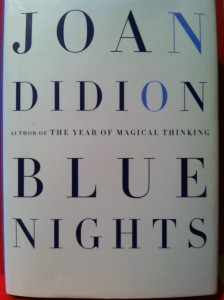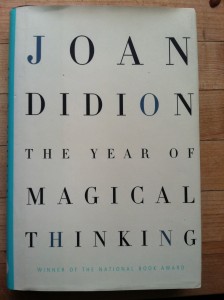Reading Under the Influence: Joan Didion
categories: Cocktail Hour / Reading Under the Influence
6 comments
A critic on a radio show not long ago asked how Joan Didion could write about the death of her husband, the death of her daughter, two books, implying something that went unsaid, maybe that Ms. Didion was exploiting her tragedies. But, Radio Guy, she’s a writer. That’s who she is. She writes about her life. Was she supposed to not write about this? Her husband, the writer John Gregory Dunne, died suddenly at their dinner table. Not long after, their adoptive daughter, Quintana, died as well, a little more slowly. Strangely, Didion doesn’t mention Quintana’s death in the first book. But I agree: that’s a different story. In these books, The Year of Magical Thinking and Blue Nights, Didion explores what we go through in the face of such loss. I say we, because while she is recounting her own experience (and very bluntly) she is speaking universally. She does this by never using a single bromide. Nothing like “Everything happens for a reason,” or “Whatever doesn’t kill you makes you stronger.” Didion tells us the truth. Things happen for no reason. Things that don’t kill you
often leave you devastated permanently.
I heard her say once (I believe on Charlie Rose, I believe about The Year of Magical Thinking): “I wouldn’t say it was about death, it’s about whether you’ll survive.”
Magical thinking refers to the not letting go of someone who is dead, not truly admitting he or she is dead. It’s denial. It’s a little theatrical, keeping a player onstage. For example a friend called once to tell me that her sister had died in a car crash, and gave the details. And later in the call she asked if I wanted to go visit her sister soon, because of course the sister could use the support. Maybe we’d just go
together and see her. I asked where and the answer was silence. I said, “But you said she has passed away.” “Yes. But let’s go see her. I think she’s in San Francisco.” Perfectly serious, perfectly logical. Even in the knowledge that the sister was dead. That was magical thinking.
The phrase “blue nights” refers to a certain time of evening at a certain time of year, a family phrase
at Didion’s house, here called up to evoke more magic, but a more atmospherical magic. The book broke my heart. And its message, to the extent is has one, is this: There really isn’t any comfort.
A student pointed out that the blue highlighting on the cover of A Year of Magical Thinking spells out J-O-H-N. On Blue Nights, it spells out N-O.




I finished Blue Nights a few weeks ago. I thought it was very poorly edited. My comment to a friend was this: Joan’s publisher said, ‘Oh Joan’s written a new book. Let’s publish it without editing.” There was one sentence on page 8 that I have read several times and can’t make sense of it: “This was a few weeks before he required us to pump in the Vikane that killed the stephanotis, killed the mint, and also killed the pink magnolia into which the twelve-year-old who took so assiduluously removed a view of our suburbia house in Brentwood had until then been able to look from her second-floor sitting-room windows.”
I liked the raw quality of much of the book and the often terse and jangly sentences. This one just means that the kid next door had been spared looking at their house until the magnolia died. I imagine the book was assiduously edited and that Ms. Didion said, at times, Stet. No one writes like her, which means we must read her only as herself… Did you like the book past the more confusing sentences at all?
As someone who facilitates Grief Recovery Groups, I applaud Joan Didion for being brave enough to write about both of her catastrophic losses. I’ve not read Blue Nights yet, but recommended The Year of Magical Thinking to many people grieving their spouse (especially in the first year). And I reference her chapter on grief often as well because it is so true.
I am going to order Blue Nights today! THanks for the reminder, Bill.
Heidi
It’s a pretty difficult book, Blue Nights, and I’d be interested to hear how it fits into the Grief Recovery model…. It’s a book by someone in great pain, I think.
I have Joan Didion’s “Salvador” in my reading pile, maybe I’ll get to it this year. Interesting your friend placed her sister in “San Francisco”; some place out of reach, but possibly attainable. A generation ago she may have “joined the French Foreign Legion”. I’m sure you’ve also heard stories of a parent who’ll keep a spouse alive, after he or she has abandoned them, making excuses and inventing stories. It’s all heartbreaking. The art of living, is to learn to survive. And to rise above and not wallow in, the ashes. Easier said than done. But attainable.
Salvador is good. Maybe a little caught in its era. But the basic subject is that reporters just went down there, stayed in the reporter’s hotel, took notes at official briefings, lots of good news about the American intervention. Didion, at personal risk, got in a car and went with a source to a dump where 100s of bodies were in view. That’s how we know about what was really happening: a reporter left the hotel.